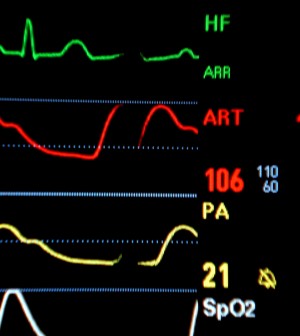- Could Your Grocery Store Meat Be Causing Recurring UTIs?
- Are You Making This Expensive Thermostat Error This Winter?
- Recognizing the Signs of Hypothyroidism
- 10 Strategies to Overcome Insomnia
- Could Artificial Sweeteners Be Aging the Brain Faster?
- Techniques for Soothing Your Nervous System
- Does the Water in Your House Smell Funny? Here’s Why
- Can a Daily Dose of Apple Cider Vinegar Actually Aid Weight Loss?
- 6 Health Beverages That Can Actually Spike Your Blood Sugar
- Treatment Options for Social Anxiety Disorder
Scientists Unlock a Key to Cell Stress


A team of researchers has uncovered a key way that cells respond to stress.
As they explain it, cells produce more than 25,000 different proteins with specific 3-D shapes, but when stressed, they can make mistakes and produce misshapen proteins that are unfolded or misfolded.
Duke University researchers found, however, that cells are able to recognize this build-up of misshapen proteins and respond by temporarily slowing down production or shutting it off entirely.
The researchers suggested that their findings, published Sept. 11 in the journal Cell, could help scientists gain a better understanding of diseases like Alzheimer’s, Lou Gehrig’s disease (ALS), Huntington’s, Parkinson’s and type 2 diabetes, which involve the accumulation of misfolded proteins.
“We have identified an entirely new mechanism for how the cell responds to stress,” study author Christopher V. Nicchitta, a professor of cell biology at Duke University School of Medicine, said in a university news release. “Essentially, the cell remodels the organization of its protein production machinery in order to compartmentalize the tasks at hand.”
Cells work like a factory, making protein on a production line: each cell has a DNA blueprint, which is first transcribed into messenger RNA or mRNA, which then travels to the outer part of the cell and is translated into proteins.
When a cell gets stressed from overheating or starvation, however, its proteins do not fold properly. These unfolded proteins trigger an alarm that causes the cell to slow down its production line and clean up the misshapen proteins. This reaction is known as the unfolded protein response, the researchers explained.
“You can slow down protein production, but sometimes slowing down the workflow is not enough,” explained Nicchitta. “You can activate genes to help chew up the misfolded proteins, but sometimes they are accumulating too quickly. Here we have discovered a mechanism that does one better — it effectively puts everything on hold. Once things get back to normal, the mRNAs are released from the holding pattern.”
Nicchitta said he was now looking for the factors that determine which mechanism cells employ during a stress response.
More information
The U.S. National Institute of Mental Health has more on the health effects of stress.
Source: HealthDay
Copyright © 2026 HealthDay. All rights reserved.










